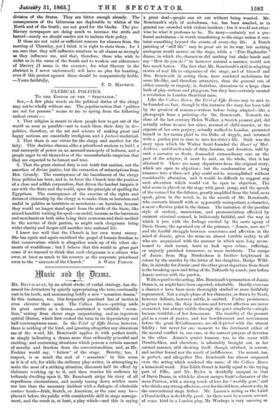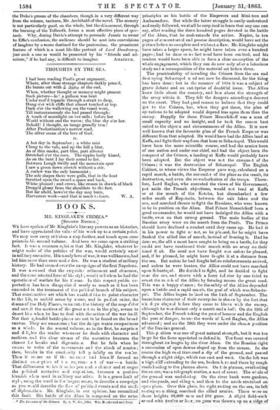Music aub' fly pram, Mn. BOUCICAULT, by an adroit stroke
of verbal strategy, has dis- armed his detractors by quietly appropriating the term continually cast in his teeth, and announcing boldly a new " sensation drama." In this instance, too, this frequently practised line of tactics is even cleverer than usual. The Colleen Bawn—putting aside its great merits as a drama—contained a veritable " sensa- tion," arising from clever stage carpentering, and an ingenious optical illusion, which first evoked the term in its depreciatory and half-contemptuous sense. In the Trial of .Efile Deans, however, there is nothing of the kind, and ignoring altogether any obnoxious use of the word, Mr. Boucicault applies it, with perfect truth, as simply indicating a drama more than ordinarily powerful and exciting, and containing situations which possess a certain amount of novelty and freedom from the conventionalities, and, as Mr. Fechter would say, " fetters" of the stage. Brevity, too, I suspect, is as much the soul of " sensation" in this sense as it is of wit, for while the ordinary play-writer, in attempting to make the most of a striking situation, discounts half its effect by elaborate working up to it, and then wearies his audience by tediously dwelling upon it, Mr. Boucicault strips his story of all superfluous circumstance, and merely toning down neither more nor less than the necessary incident with a dialogue of admirable couleur locale—Irish, Scotch, or American, as the case may be— places it before the public with considerable skill in stage manage-.
a great deal—people can sit out without being wearied. Mr.
Boucicault's style of melodrama, too, has been assailed, as in general too crowded with violent incident ; but it would not other- wise be what it professes to be. No story—certainly not a pro- fessed melodrama—is worth transferring to the stage unless it con- tains something beyond the events of every-day life. A Dutch painting of "still life" may be great art in its way, but nothing analogous would answer on the stage, while a " Prx-Raphaelite " drama, in which the characters did nothing but shake hands and say "How do you do ?" in however natural a manner, would not fare much better. The fact that Mr. Boucicault's skill in adapting stories of real life to exigencies of the stage, and of himself and Mrs. Boucicault in acting them, have rendered melodrama far more life-like, and therefore attractive, than the general run of either comedy or tragedy, is, doubtless, obnoxious to a large class both of play-writers and playgoers, but they have certainly created a revolution in London theatrical taste.
Like the Colleen Bawn, the Trial of Effie Deans may be said to be founded on fact, though in this instance the story has been told by the greatest of romance-writers before being adapted—like a photograph from a painting—by Mr. Boucicault. Towards the close of the last century Helen Walker, a Scotch peasant girl, did actually refuse to save her sister, accused of child-murder, at the expense of her own perjury, actually walked to London, presented herself in her tartan plaid to the Duke of Argyle, and returned with a pardon just in time to save her sister's life. Such was the story upon which Sir Walter Scott founded the Heart of Mid- Lothian ; and if such a tale of duty, heroism, and devotion, told by such a narrator as Scott, demanded extraordinary care on the part of the adapter, it must be said, on the whole, that it has obtained it. There are many departures from the original story, which are open to objection ; but the condensation of a long romance into a three-act play could not be accomplished without considerable alteration, and it would be difficult to suggest any such alteration which would rot be open to objection. The trial scene is placed on the stage with great pomp, and the speech of the counsel for the defence, greatly amplified from the brief, so to speak, given in the novel, is, in the mouth of Mr. Boucicault, who contents himself with so ar prently unimportant a character, a most effective point in the drama. The imitation of the peculiar style of oratory, mannerism, and pronounciation affected by eminent criminal counsel, is ludicrously faithful, and the way in which it jars with the feelings excited by the mute agony of Davie Deans, the agonized cry of the prisoner, "Jeanie, save me!" and the fearful struggle between conscience and affection in the mind of Jeanie, gives the scene an almost terrible reality to all who are acquainted with the manner in which men, long accus- tomed to such scenes, learn to look upon crime, suffering, or unjustly punished innocence, as mere incidents. The escape of Jeanie from Meg Murdochson is further heightened in colour by the murder by the latter of her daughter, Madge Wild- fire, in mistake for Jeanie; and the other great departure from Scott is the breaking open and firing of the Tolbooth by a mob, just before Jeanie arrives with the pardon.
With regard to the acting, Mrs. Boucicault's personation of Jeanie Deans is, as might have been expected, admirable. Hardly ever can a character have been more thoroughly studied or more faithfully represented. Not a single phase of her character, as drawn by Scott, however delicate, however subtle, is omitted. Undue prominence is given to none, the deep heroism and fervent affection are never overacted, but always visible through the quiet simplicity—simple because truthful— of her demeanour. The timidity of the peasant girl in a court of justice, and her bewilderment and nervousness before the great M`Callummore, are all depicted with the utmost fidelity ; but never for one moment to the detriment either of the mental conflict in one case, or the earnest purpose of devotion in the other. Jeanie's quaint humour, too, in the scene with Dumbiedikes, and elsewhere, is admirably brought out, as her natural manner, still showing itself, though subdued, in sorrow, and neither forced nor the result of indifference. The accent, too, is perfect, and altogether Mrs. Boucicault has almost surpassed even the acting which rendered the name of the Colleen Bawn a household word. M iss Edith Stuart is hardly equal to the trying part of Effie, and Mr. Ryder is decidedly unequal to that of Davie Deans, in which he almost merges Scott's character of the stern Puritan, with a strong touch of love for "worldly gear," and who thinks any strong affection, even for his children, almost a sin, in the conventional stage father. Mr. Leeson's acting as the Laird o'Dumbiedikes is decidedly good. As there must be a comic servant the Duke's groom of the chambers, though in a very different way from the solemn, taciturn, Mr. Archibald of the novel. The scenery is not particularly good, on the whole, but the denouement, through the burning of the Tolbooth, forms a most effective piece of spec- tacle. Why, during Davie's attempt to persuade Jeanie to swear to Effie's confession, the audience should be sent into convulsions of laughter by a scene destined for the pantomime, the prominent feature of which is a most life-like portrait of Lord Dundreary, just such a one as would be presented by his " friends and ad- mirers," if he had any, is difficult to imagine. AMATEUR.































 Previous page
Previous page